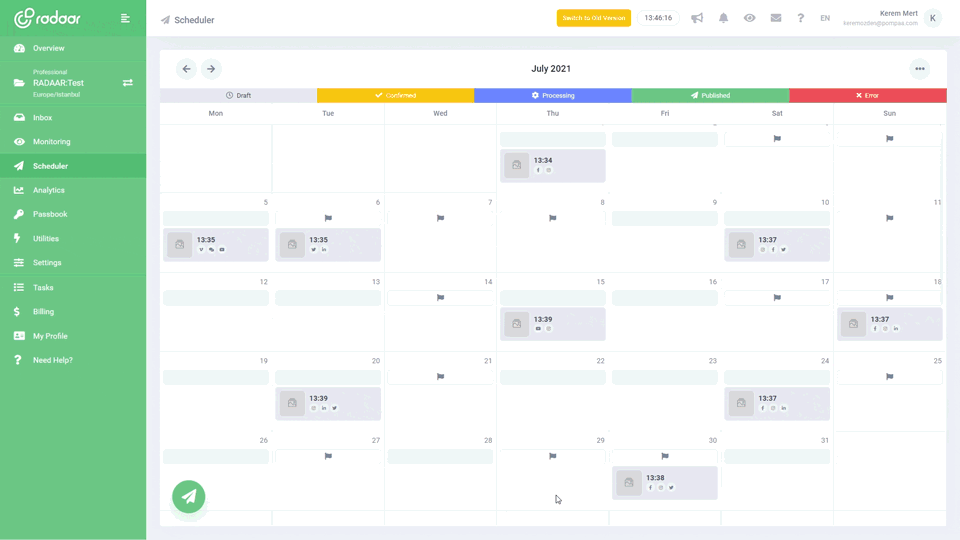Are you tracking these crucial social media metrics?
Unlock the true potential of your social media strategy by diving into our latest blog post, where we explore the essential metrics every marketer should track to drive growth and engagement. Discover actionable insights and boost your online presence by reading the full post!
LEARN MORE LAUNCH DEMO NOW In today's digital age, navigating the ever-evolving landscape of social media can be both exciting and daunting. With millions of users interacting on platforms like Facebook, Instagram, Twitter, and LinkedIn every second, understanding the dynamics of these interactions is crucial for businesses, influencers, and marketers alike. But are you keeping track of the right metrics to ensure your social media efforts yield the best results? In this blog post, we'll uncover some of the most essential social media metrics you should be tracking to ensure your online presence is not just existent, but thriving.
Measuring the success of your social media strategy goes beyond simply counting likes or shares. It's about diving deep into analytics and understanding how your content resonates with your audience. This includes examining metrics such as engagement rates, click-through rates, and conversion metrics to gauge your reach and influence effectively. By focusing on these key indicators, you can fine-tune your strategies, build stronger connections with your audience, and achieve your business goals. So, whether you're a veteran social media manager or a curious newbie, let's explore these crucial metrics that can make or break your social media success.
Measuring the success of your social media strategy goes beyond simply counting likes or shares. It's about diving deep into analytics and understanding how your content resonates with your audience. This includes examining metrics such as engagement rates, click-through rates, and conversion metrics to gauge your reach and influence effectively. By focusing on these key indicators, you can fine-tune your strategies, build stronger connections with your audience, and achieve your business goals. So, whether you're a veteran social media manager or a curious newbie, let's explore these crucial metrics that can make or break your social media success.
Table of Contents
- What are the engagement metrics you need?
- How can sentiment analysis guide your strategy?
- Are your social referrals driving traffic effectively?
- Do conversion rates meet your business objectives?
- Is your brand awareness growing as expected?
- What do response times reveal about customer care?
- How does video performance affect engagement rates?
- Why is tracking reach crucial for social success?
- Are you ready to monitor your social metrics?
What are the engagement metrics you need?
Engagement metrics are the lifeblood of understanding how your audience interacts with your social media content. Key metrics to track include likes, comments, shares, and saves, as they provide insights into what resonates with your audience and what doesn’t. Additionally, the click-through rate (CTR) reveals how effective your posts are at driving traffic to your website or landing pages. Delving into these metrics helps tailor your strategy to boost interaction, foster community, and ultimately achieve your social media goals.
How can sentiment analysis guide your strategy?
Sentiment analysis can be a game-changer for your social media strategy, offering deeper insights beyond mere numbers. By examining the tone of your audience's comments and feedback, you gain a clearer picture of how your brand is perceived. This understanding allows you to tailor your content, addressing any concerns and amplifying positive sentiments. When you know what resonates with your audience emotionally, you can create more engaging and relevant content that fosters a loyal community and strengthens brand reputation.
Moreover, tracking sentiment over time can highlight emerging trends and shifts in public perception, enabling you to stay ahead in the ever-changing social media landscape. By analyzing these sentiments, you can identify potential areas for improvement in your product or customer service, which can lead to enhanced customer satisfaction. This proactive approach not only helps in crisis management by enabling timely interventions but also contributes to building a more authentic and trustworthy brand image. Ultimately, leveraging sentiment analysis as part of your social media strategy empowers you to connect more deeply with your audience and achieve your business goals.
Moreover, tracking sentiment over time can highlight emerging trends and shifts in public perception, enabling you to stay ahead in the ever-changing social media landscape. By analyzing these sentiments, you can identify potential areas for improvement in your product or customer service, which can lead to enhanced customer satisfaction. This proactive approach not only helps in crisis management by enabling timely interventions but also contributes to building a more authentic and trustworthy brand image. Ultimately, leveraging sentiment analysis as part of your social media strategy empowers you to connect more deeply with your audience and achieve your business goals.
Are your social referrals driving traffic effectively?
Are your social referrals driving traffic effectively? It's essential to regularly monitor how much traffic is coming to your website from social media platforms. Dive into your analytics to see which platforms are sending the most visitors and whether those visitors are engaging with your content and converting. By identifying the most fruitful channels, you can focus your efforts on what works best and tweak your strategies for any underperforming networks, ensuring your social media efforts truly make an impact.
Do conversion rates meet your business objectives?
Understanding whether your conversion rates align with your business objectives is pivotal for maximizing the impact of your social media efforts. Tracking conversion rates allows you to gauge how effectively your social channels contribute to your bottom line, whether it's driving sales, generating leads, or nurturing customer relationships. By analyzing this metric, you can adjust your strategies to better meet your goals, ensuring that each post, campaign, or ad is aligned with what you aim to achieve. Regularly reviewing and refining your approach based on conversion data can lead to more targeted efforts and ultimately, more successful outcomes.
Is your brand awareness growing as expected?
Is your brand awareness growing as expected? Keeping an eye on brand mentions, reach, and the number of followers across platforms can show whether your brand's visibility is increasing over time. By analyzing these metrics, you can determine if your current strategies are effective or if adjustments are needed to make a stronger impact. Regularly monitor these indicators to ensure your brand is not just keeping up but thriving in the fast-paced world of social media.
What do response times reveal about customer care?
Response times on social media are a telling indicator of a brand's commitment to customer care. Quick response times demonstrate a company's dedication to addressing customer concerns promptly, which can enhance customer loyalty and satisfaction. Conversely, delayed responses might suggest a lack of resources or prioritization of customer interactions, which could lead to negative perceptions. By actively monitoring and improving response times, companies can create a more positive customer experience and strengthen their brand reputation.
How does video performance affect engagement rates?
Video performance plays a significant role in boosting engagement rates on social media platforms. When viewers find your videos captivating and engaging, they are more likely to like, comment, and share, which helps increase visibility and reach a broader audience. Videos that connect emotionally or provide value encourage longer watch times and prompt interactions, which are key indicators of engagement. By analyzing metrics like view count, average watch time, and interaction rate, you can adjust your video content strategy to maximize audience engagement and nurture community growth.
Why is tracking reach crucial for social success?
Tracking reach is crucial for social media success because it gives you a clear picture of how many unique users are being exposed to your content. Understanding reach helps you assess the effectiveness of your posts and aids in identifying content that engages a broader audience. With this insight, you can tailor your strategy to increase visibility and engagement, ultimately growing your brand's influence online. By keeping a close eye on this metric, you're able to make informed decisions that drive more significant results in your social media efforts.
Are you ready to monitor your social metrics?
Monitoring social media metrics is not just a task but an essential strategy to grow and sustain your online presence. By keeping a close eye on these metrics, you can make informed decisions, tailor your content strategy, and truly understand what resonates with your audience. If you're not already tracking these metrics, it's time to dive in and start leveraging the data to boost your engagement, reach, and conversions. Remember, each platform offers unique insights, and by harnessing these, you're setting yourself up for a successful and dynamic social media presence.
As you embark on tracking these crucial metrics, take a holistic approach and integrate both quantitative data and qualitative feedback to paint a complete picture of your social media performance. Don’t be overwhelmed—start with a handful of key metrics, measure them consistently, and adjust your strategy as you gain more insights. With a friendly attitude towards learning and adaptation, you're sure to see the rewards of your efforts. Social media is ever-evolving, and being proactive about monitoring your metrics is the key to staying ahead of the curve. So, are you ready to turn data into actionable insights and elevate your social media game?
As you embark on tracking these crucial metrics, take a holistic approach and integrate both quantitative data and qualitative feedback to paint a complete picture of your social media performance. Don’t be overwhelmed—start with a handful of key metrics, measure them consistently, and adjust your strategy as you gain more insights. With a friendly attitude towards learning and adaptation, you're sure to see the rewards of your efforts. Social media is ever-evolving, and being proactive about monitoring your metrics is the key to staying ahead of the curve. So, are you ready to turn data into actionable insights and elevate your social media game?
SOCIAL MEDIA SCHEDULER
Plan and publish...
Plan and publish your content for Facebook, Instagram, Twitter, and LinkedIn from one simple dashboard.
LEARN MORE FREQUENTLY ASKED QUESTIONS
What is social media management platform?
RELATED BLOG POSTS
All the tips & tricks you'll need...
Get the fresh tips and tricks you'll need to ace social media marketing.













